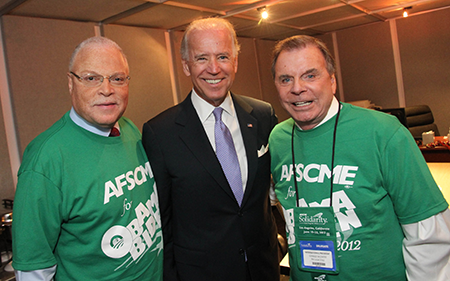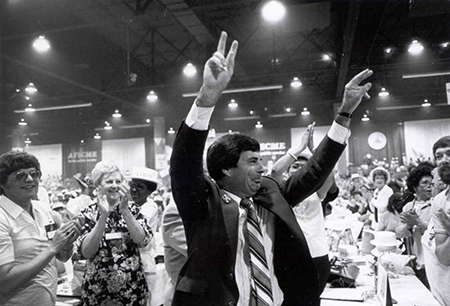Jerry McEntee: 1935–2022

Jerry McEntee (right) with then-Vice President Joe Biden and current AFSCME President Lee Saunders (left) in 2012.
Gerald W. McEntee, the longtime president of the American Federation of State, County and Municipal Employees (AFL-CIO), who led the union to historic growth, positioning it as a voice for working people and a force to be reckoned with in the nation’s civil rights movement, and who went toe to toe with U.S. presidents in defense of public services, passed away Sunday at his home in Naples, Florida. He was 87.
So much of a giant in the labor movement and progressive politics was McEntee that former President Bill Clinton once remarked “he had the heart of a lion,” and that if Clinton was ever in a foxhole, McEntee was the person he wanted with him, while former President Barack Obama noted that McEntee “built AFSCME into such an important force for change.”
But such praise always struck McEntee – the plainspoken boy from Philadelphia’s working-class Swampoodle neighborhood – as too grandiose. From the fight for affordable health care for all to the struggle to preserve workers’ rights to come together and bargain for safe working conditions and fair wages in a union, McEntee spoke the language of working men and women. And with that voice, that force and will to bring change, and that lion’s heart, he got results.
Among McEntee’s lasting achievements as president of AFSCME was the development of a national political program that became the most sophisticated in the American labor movement. Through a combination of grassroots activism, innovative tactics and shrewd strategy, McEntee positioned AFSCME as a prominent political force in progressive politics. In recognition of his acumen, McEntee was tapped by successive presidents of the AFL-CIO to lead its political committee.
Whether taking on corrupt local garbage contracts or outsourcing boondoggles or an unjust prisons-for-profit pipeline, McEntee led the fight against privatization and contracting out to protect vital public services. At every turn, from shop floors and union halls across the country, to the halls of Congress and the White House, he pushed back on the false promises of privatization. When then-President George W. Bush threatened to privatize Social Security, McEntee mobilized an army of AFSCME retirees and working members – the famed AFSCME “Green Machine” – to show up at every planned stop on the president’s road show, speaking out and up against the misguided agenda.
In 2011, he helped establish a massive campaign to go on offense against attacks on public service workers in states across the country - a pivotal moment that many credit with helping to reverse labor’s slide in popularity, which today stands at a 50-year high.

Jerry McEntee with his wife, Barbara.
Gerald W. McEntee was born in 1935 in Philadelphia, Pennsylvania, to Mary and William J. McEntee, a city sanitation truck driver. He learned the lessons of solidarity and justice in the face of political might watching his father organize fellow sanitation workers in the city of Philadelphia. Even in his pre-college days, McEntee began the worker organizing that would ultimately cement his status as a legend in the labor movement. Working for a beach umbrella and chair vendor during summers at Wildwood, New Jersey, he led his first strike, over uncompensated work on rainy days. He was fired, but undeterred to keep fighting for working folks.
His own AFSCME story began in 1956, when he became a member of and, later, a staffer at AFSCME District Council 33, representing municipal workers in Philadelphia. It was there that he dreamed of organizing Pennsylvania’s public employees. As leader of the Pennsylvania Organizing Committee, he saw those dreams become a reality when Act 195 was signed into law in July 1970 and 76,000 commonwealth employees voted for AFSCME.
McEntee had a well-earned reputation as a tough and savvy negotiator. On Aug. 30, 1973, McEntee, while serving as executive director of AFSCME Council 13, signed a three-year agreement with the state that meant for the first time, members had fully paid health insurance coverage and a prescription drug program. However, the oil crisis in 1975 threatened that agreement with workers over their wages, leading to a standoff. The state would not budge and McEntee led state employees on the largest public employee strike in United States history. A settlement was reached by the third day of the strike.

Jerry McEntee was a tireless champion of workers rights throughout his life.
On Dec. 17, 1981, McEntee was elected president of AFSCME to lead the union after the passing of Jerry Wurf. He would helm the union until 2012, when the torch passed in an historic election to current President Lee Saunders, who served as McEntee’s secretary-treasurer.
At the 1984 convention in San Francisco, McEntee was elected to his first full term as the union’s president. He told delegates that AFSCME must meet new challenges and continue to adapt. “We have to continue to take risks, knowing that we will sometimes stumble as we have before, but knowing just as clearly that if we do nothing to shape our future, we will be overwhelmed.” These words guided him for the next 31 years at AFSCME’s helm. (While on the subject of words, it bears mentioning that McEntee was also known to tactically deploy colorful language in dealings with elected officials as needed).
McEntee fought discrimination wherever it existed. In the 1980s, that meant tackling gender-based wage discrimination. Under McEntee’s leadership, AFSCME made pay equity a major bargaining issue. AFSCME negotiators bargained significant comparable worth settlements in states and cities throughout the country. In 1986, the union won a pay equity victory in the courts in Washington State, capping a battle AFSCME began in 1973. In 1984, he was arrested outside the South African embassy in Washington, D.C., in protest of apartheid. In 1990, Nelson Mandela appeared beside McEntee at the AFSCME International Convention in Miami, just months after his release from 27 years in prison.
McEntee recognized AFSCME’s crucial role in fighting for progressive legislation, winning federal funding for state and local public services that sustained and improved lives in communities nationwide. He mobilized AFSCME in support of significant laws, including the Family and Medical Leave Act, increases in the minimum wage, the Americans with Disabilities Act, the Civil Rights Act of 1991, the Lilly Ledbetter Fair Pay Act, the American Recovery and Reinvestment Act and, in 2010, the Affordable Care Act.
McEntee also put in place one of the strongest organizing programs in the labor movement. He continued to fight for state and local collective bargaining legislation to allow public service employees to organize and welcomed many independent worker representation groups into AFSCME.
McEntee is preceded in death by his daughter Christine Serenelli, his parents William and Mary McEntee, and siblings William, Patsy and Patrick.
He is survived by his wife, Barbara, his sister Mary Casale, his daughters Patricia (Michael Gehlen), Kathleen (William Hammock), and Kelly (Bruce Hamlin), 10 grandchildren and five great-grandchildren.
The family will hold a private service in Naples, Florida, at a date to be determined. AFSCME will hold a memorial service in the near future to celebrate the many contributions McEntee made in the fight for a fairer and more just world.
